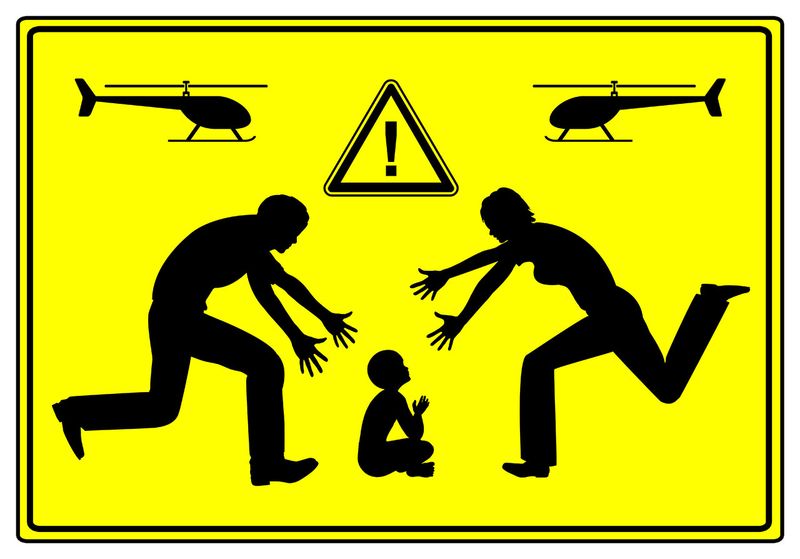Parenting is a crucial aspect of family dynamics. The way you raise your children can significantly influence the balance and harmony within your household. An unbalanced family often stems from specific parenting styles that may unknowingly create tension, misunderstandings, and emotional distress. Recognizing these patterns is the first step towards fostering a healthier family environment. In this article, we explore twelve distinct ways your parenting style might be contributing to an unbalanced family.
1. Overprotection

When parents become overly protective, they may unintentionally hinder their child’s ability to develop independence. A child needs to experience minor challenges to build resilience. Shielding them from every adversity can lead to anxiety and dependency. Overprotective parenting can create an environment where children lack confidence in their abilities, feeling insecure without parental guidance.
This can stifle creativity and problem-solving skills. Encouraging safe exploration helps in developing a strong sense of self-reliance. It is crucial for children to learn from their mistakes, as these experiences contribute to personal growth. Balance is key in nurturing autonomy while providing safety.
2. Authoritarian Discipline

Authoritarian parenting often emphasizes rules and strict discipline, potentially leading to a strained relationship between parent and child. The lack of open communication can cause children to feel misunderstood and unvalued. This style often results in obedience, but at the cost of fostering resentment and rebellion.
Children raised in such environments may struggle with decision-making and could exhibit low self-esteem. They might become adept at following orders but lack creativity or initiative. Encouraging dialogue and understanding promotes a more balanced approach, helping children feel respected and empowered.
3. Permissive Parenting

Permissive parenting is marked by a lack of boundaries, where children often make their own rules. While it may seem liberating, this approach can lead to confusion and lack of discipline. Children may struggle with authority and exhibit behavioral problems.
Without clear guidelines, children find it difficult to respect limits and responsibilities. They might develop an unrealistic sense of entitlement, expecting others to cater to their whims. Teaching accountability and consistency is essential in guiding children towards responsible adulthood.
A balance between freedom and rules is crucial for nurturing well-adjusted individuals.
4. Neglectful Approaches

Neglectful parenting, whether intentional or unintentional, can severely impact a child’s emotional and social development. When parents are unavailable or unresponsive, children may feel abandoned and unworthy of attention. This can lead to difficulties in forming healthy relationships later in life.
They might exhibit behavioral issues or withdrawal from social interactions. Providing emotional support and engagement is vital for a child’s growth. Spending quality time with your child ensures they feel valued and secure.
Simple actions, like listening and participating in their activities, foster a loving and supportive environment.
5. Inconsistent Rules

Inconsistent parenting involves shifting rules and expectations, which can bewilder children and disrupt family harmony. When guidelines constantly change, children struggle to understand what is expected of them, leading to frustration and anxiety.
Consistency helps children feel secure and understand the consequences of their actions. It also builds trust between parent and child, as they rely on predictable responses.
Establishing clear, consistent rules and following through helps create a stable environment where children can thrive. It’s essential for parents to communicate and align their parenting strategies to avoid confusion.
6. Helicopter Parenting

Helicopter parenting involves excessive involvement in a child’s life, where parents closely monitor every aspect. This can prevent children from developing their own problem-solving skills and independence. Constant supervision may lead children to feel inadequate or incapable of handling challenges on their own.
While well-intentioned, such over-involvement can stifle creativity and self-confidence. Children might become reliant on parents for decision-making, affecting their ability to function independently later in life.
Encouraging autonomy while providing guidance fosters more well-rounded individuals, ready to face life’s challenges with confidence and competence.
7. Pressure to Achieve

When parents place undue pressure on children to excel, it can lead to stress and burnout. This pressure often stems from a desire for their children to succeed but can result in negative emotional outcomes. Children may become anxious, fearing failure and disappointing their parents.
This fear can diminish their love for activities they once enjoyed, turning them into obligations rather than passions. Encouraging children to set their own goals and celebrating their efforts fosters intrinsic motivation.
Balancing encouragement with acceptance of individual growth is key to nurturing a healthy, motivated child.
8. Lack of Emotional Support

Emotional support is crucial for a child’s development, yet some parenting styles fail to provide it. When parents are emotionally unavailable, children may feel isolated and misunderstood. This absence of support can hinder emotional maturity and lead to difficulties in expressing feelings.
Children who lack emotional backing may struggle with self-worth and forming connections. Providing a nurturing environment where emotions are acknowledged and validated is essential.
Engaging in open conversations and showing empathy helps build a strong emotional foundation, enabling children to navigate their feelings healthily and confidently.
9. Micromanaging

Micromanaging involves controlling every aspect of a child’s life, often leaving little room for personal growth. This overbearing style can stifle creativity and hinder a child’s ability to make decisions independently. Children may feel their efforts are never good enough, leading to diminished self-esteem.
Allowing children to take charge of their tasks fosters responsibility and self-confidence. It’s important for parents to step back and give children space to learn from their experiences.
Trusting their capabilities encourages initiative and resilience, key traits for successfully navigating adulthood.
10. Favoritism

Favoritism in parenting can create rivalry and resentment among siblings, disrupting family harmony. When one child receives more attention or praise, others may feel neglected and undervalued. This can lead to competition and strained sibling relationships.
Children should feel equally loved and appreciated for their unique strengths and qualities. Ensuring fair treatment fosters a sense of belonging and unity within the family.
Recognizing each child’s individuality and celebrating their achievements equally helps cultivate a supportive and inclusive family environment.
11. Overindulgence

Overindulgence involves providing children with too much, whether in material goods or leniency. This can lead to entitlement and lack of gratitude, as children come to expect excessive rewards or privileges.
While giving is an expression of love, moderation is essential to teach children the value of effort and appreciation. Overindulgent parenting can result in difficulties in understanding the importance of boundaries and responsibilities.
Encouraging children to earn their rewards through hard work instills discipline and respect for others, fostering a balanced and grounded upbringing.
12. Lack of Boundaries

A lack of boundaries in parenting can create chaos and uncertainty within the family. When rules are unclear or non-existent, children may struggle to understand acceptable behavior. This can lead to conflicts and a lack of respect for authority.
Establishing clear boundaries helps children feel secure and understand the structure of their environment. Consistent enforcement of rules promotes discipline and mutual respect.
Creating a balanced approach where rules are communicated effectively and understood ensures a harmonious household, where children learn to thrive within set limits.

